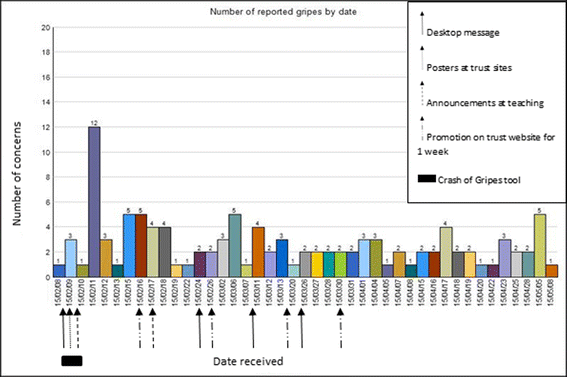Developing the 'gripes' tool for junior doctors to report concerns: a pilot study
- PMID: 27853623
- PMCID: PMC5108408
- DOI: 10.1186/s40814-016-0100-0
Developing the 'gripes' tool for junior doctors to report concerns: a pilot study
Abstract
Background: Junior doctors often have concerns about quality and safety but show low levels of engagement with incident reporting systems. We aimed to develop and pilot a web-based reporting tool for junior doctors to proactively report concerns about quality and safety of care, and optimise it for future use.
Methods: We developed the gripes tool with input from junior doctors and piloted it at a large UK teaching hospital trust. We evaluated the tool through an analysis of concerns reported over a 3-month pilot period, and through interviews with five stakeholders and two focus groups with medical students and junior doctors about their views of the tool.
Results: Junior doctors reported 111 concerns during piloting, including a number of problems previously unknown to the trust. Junior doctors felt the tool was easy to use and encouraged them to report. Barriers to engagement included lack of motivation of junior doctors to report concerns, and fear of repercussions. Ensuring transparency about who would see reported concerns, and providing feedback across whole cohorts of junior doctors about concerns raised and how these had been addressed to improve patient safety at the trust, were seen having the potential to mitigate against these barriers. Sustainability of the tool was seen as requiring a revised model of staffing to share the load for responding to concerns and ongoing efforts to integrate the tool and data with other local systems for gathering intelligence about risks and incidents. Following piloting the trust committed to continuing to operate the gripes tool on an ongoing basis.
Conclusions: The gripes tool has the potential to enable trusts to proactively monitor and address risks to patient safety, but sustainability is likely to be dependent on organisational commitment to staffing the system and perceptions of added value over the longer term.
Conflict of interest statement
All authors declare that they have no competing interests.
References
-
- Department of Health . An organisation with a memory—report of an expert group on learning from adverse events in the NHS. 2000.
-
- Department of Health . A promise to learn: a commitment to act. Improving the safety of patients in England. National Advisory Group on the Safety of Patients in England. 2013.
-
- Francis R. Freedom to speak up: an independent review into creating an open and honest reporting culture in the NHS. 2015.
-
- Department of Health . Report of the Mid Staffordshire NHS Foundation Trust public inquiry: executive summary. London: Stationery Office; 2013.
Grants and funding
LinkOut - more resources
Full Text Sources
Other Literature Sources


